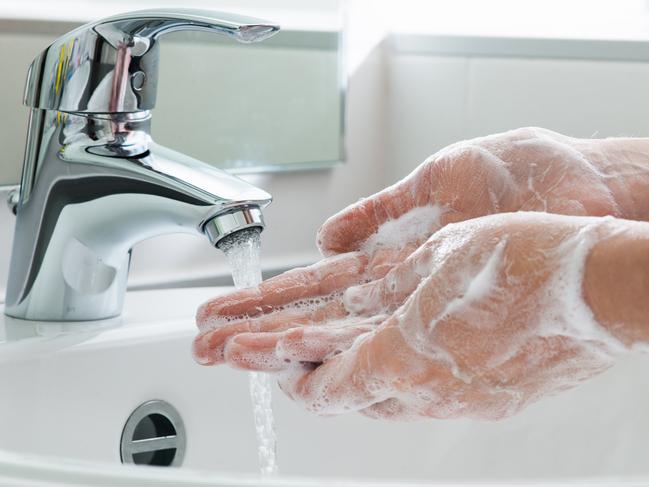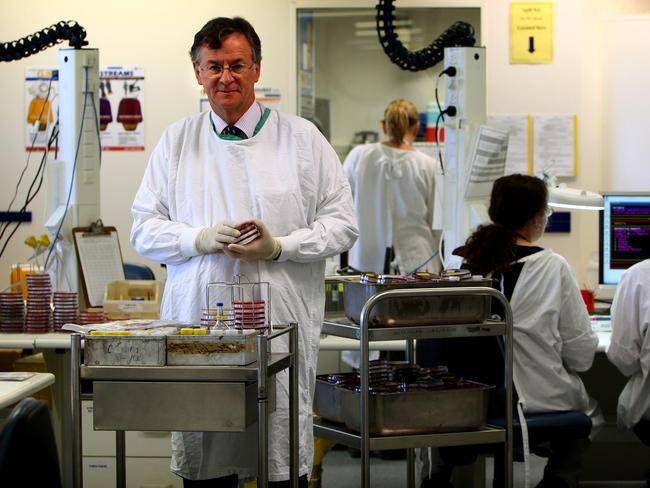Coronavirus sparks rise in children poisoned by hand sanitiser
While most Australians have escaped coronavirus some children are being made sick by the substances used to prevent it with a spike in hand sanitiser poisonings.
Coronavirus
Don't miss out on the headlines from Coronavirus. Followed categories will be added to My News.
Exclusive: A rising number of children are suffering poisoning from hand sanitiser — the most sought after product in the COVID-19 pandemic.
And News Corp can reveal some of the sanitiser has been consumed from containers looking like drink bottles, which have been made by companies pivoting their business model in the climate, including distilleries.
The nation’s medicines regulator is so concerned it has written to the states and territories asking them to enforce existing bans on the use of these containers for this purpose.
The NSW Poisons Information Centre which fields poisons calls for many states said there had been an increase in calls about accidental poisonings from hand sanitiser which is harmful to children if swallowed.
In April 2020 there were 164 calls about hand sanitiser poisoning compared to 65 calls in the same month last year.
“May 2020 is showing similar increases with more than double the calls in the first two weeks relative to 2019,” the centre told News Corp.
“In response to this increase the NSW Poisons Information Centre is following up on every hand sanitiser exposure to determine if there are any risk factors relating to packaging, labelling or formulation of the products. This information will be passed on to the ACCC Product Safety or TGA as needed.

On its social media page, the centre said: “The shortage of hand sanitiser in supermarkets has led to the emergence of “homemade” and unfamiliar products, which may be produced overseas. Some are appearing in large drink-type containers without childproof lids, which can easily be mistaken for a water bottle!”
There was a threefold increase in hand sanitiser incidents in Queensland with the Queensland Poisons Information Centre taking 72 calls about hand sanitisers, compared with 21 calls in the same month last year.
The cases in March were minor, and most did not require hospital intervention.
“Of concern, especially for children, was where people had decanted cleaners or hand sanitisers into non-original containers,” the centre said.
The Victorian Poisons Information Centre did not respond to News Corp’s inquiries.
South Australia’s department of health said all calls to the poison hotline are handled by NSW and WA.
Commonwealth Health Department Deputy Secretary and Therapeutic Goods Administration (TGA) boss Professor John Skerritt told News Corp children’s safety is being put at risk “to save 10 to 15 cents on manufacturing costs”.
“To cut costs people are putting it in drink bottles and that is worrying because little kids can’t read and think it is a drink,” he said.
He is particularly concerned some people are using drink bottles with a pop up squirter that looks like a water or soft drink bottle.
Drinking hand sanitiser can cause alcohol poisoning and low blood sugar, it can also damage the throat and stomach.
ANU infectious diseases expert Professor Peter Collignon said it was very important hand sanitiser containers were kept safe from children because some alcohol like methylated spirits could cause blindness.
“Putting them in a drink bottle is not a good idea,” he said.
Many hand sanitisers contain the alcohol ethanol which can cause drunkenness.
Some contain isopropyl alcohol which is toxic and can cause brain damage, blindness, kidney and liver damage.
The other problem is that many backyard operators making hand sanitiser may be making products that didn’t work to kill off viruses and bacteria.
“They need to be 60 to 80 per cent alcohol to be effective,” Professor Collignon said.
Products that were 100 per cent alcohol would not work because they needed water to act on the bacteria, he said.

Under special COVID-19 exemptions breweries and companies that made boutique gins, whiskeys and other alcohol products were permitted to make hand sanitiser for the first time to deal with a nationwide shortage.
Australian Distillers Association representative David Goulding who is making Grandad Jack hand sanitiser said many spirit companies were going broke as hotels and bars were closed due to COVID-19 and the shift to hand sanitiser production had saved jobs.
“We have made it clear to our members that no-one should be using spirit bottles or anything that looks like a drink bottle,” he told News Corp.
In the first month after COVID-19 hit it was hard to source plastic bottles and he had seen some back yard operators using water bottles as containers for hand sanitisers, he said.
“These are the sorts of things that happen when the government says anyone can make it without a licence,” he said.
Mr Goulding said Australian distillers now had large stockpiles of hand sanitisers but a recent large shipment from China had undercut the local producers who could not make the product as cheaply as China.
He is distressed that state and local governments are now buying cheap Chinese hand sanitiser rather than Australian made products.
Originally published as Coronavirus sparks rise in children poisoned by hand sanitiser


